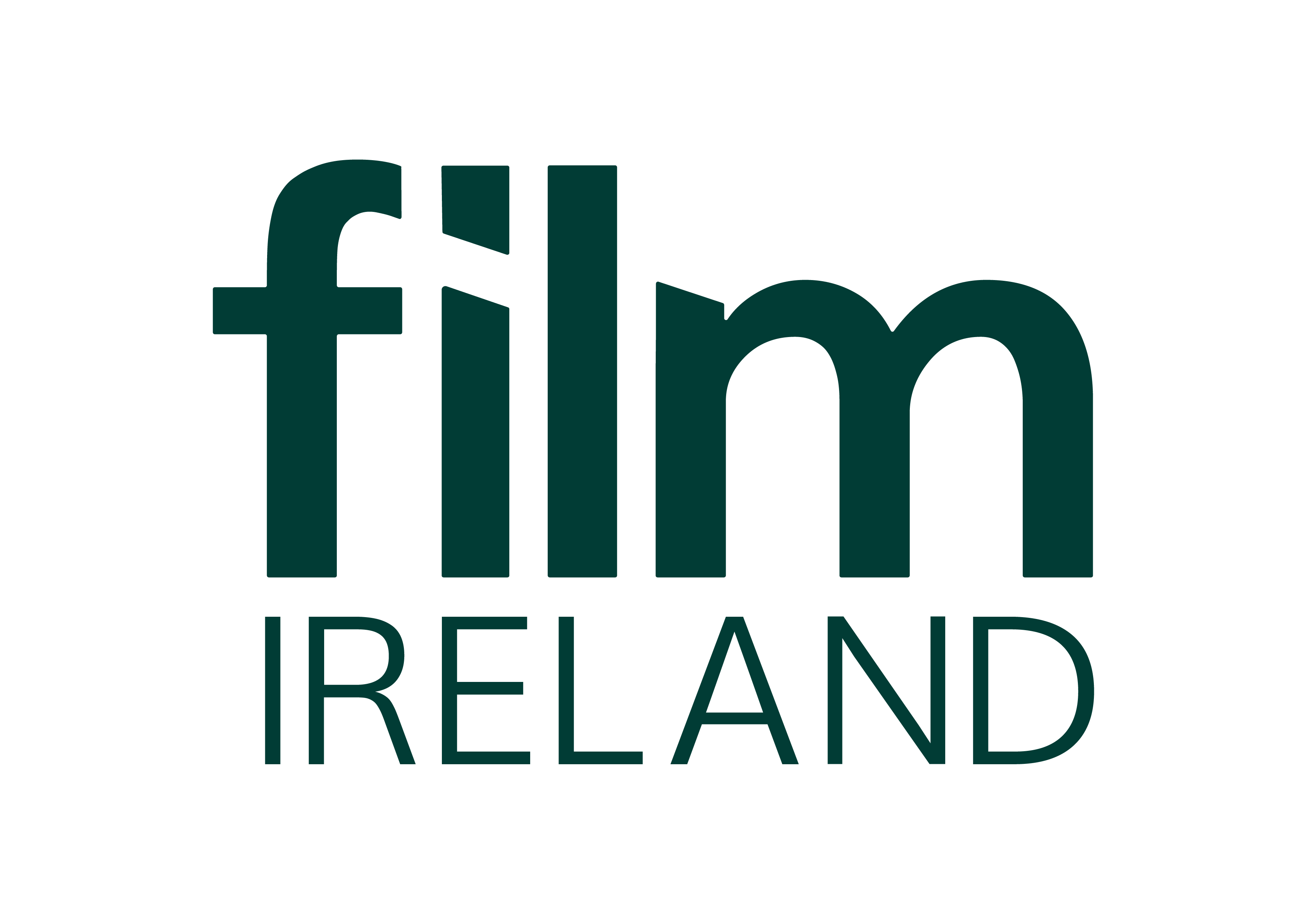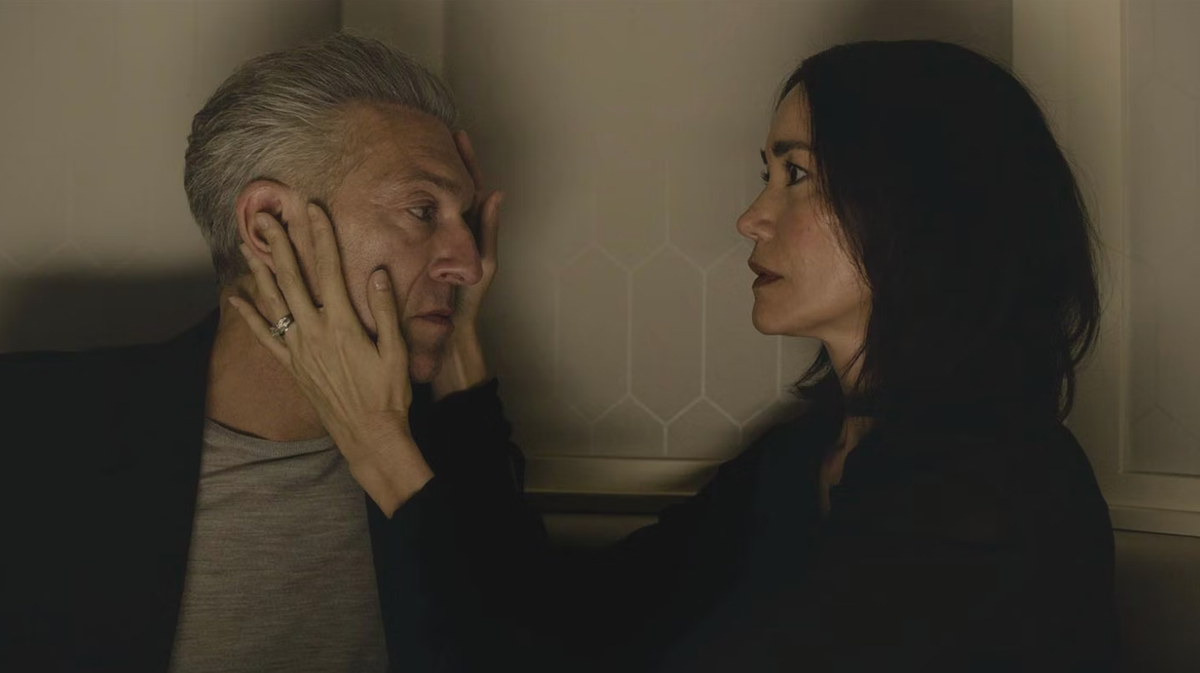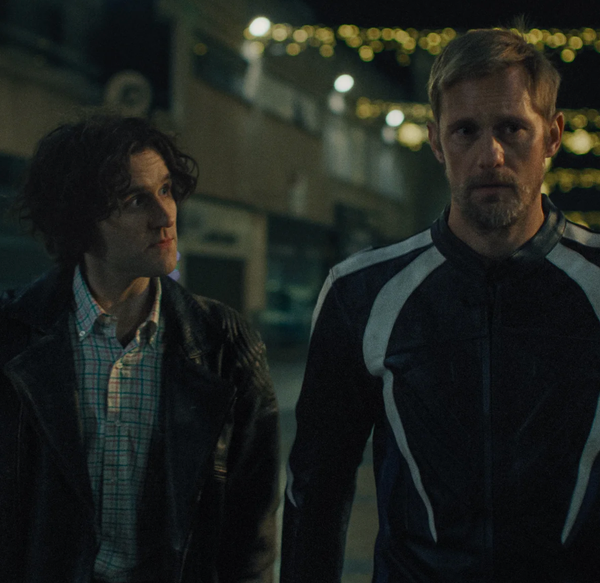Olivia O'Ríada digs deep in her review of The Shrouds.
In present times, our panopticon of social media and surveillance feels all-encompassing, but it fortunately doesn’t follow us after our deaths. Ever the optimist, master of sci-fi horror David Cronenberg’s new film The Shrouds imagines a world where the wonders of technology have broken even that wall. Karsh (Vincent Cassel, styled in hair and costume to look uncannily like director Cronenberg) is an obsessive widower who has seemingly built his entire life around his grief for his late wife, Becca (Diane Kruger). We meet him on a cordial date, which comes to a sudden end when they take a walk out of the restaurant so he can show her his wife’s resting place. He’s made a fortune as the CEO of GraveTech. They’re the proprietors of a new form of high-tech grave, which allows any bereaved loved one a 24/7 live three-dimensional image of the deceased from their final resting place, on any screen they own. Karsh, of course, is a frequent user of his own technology. There’s rarely a scene in the film where he doesn’t idly stare at a phone or tablet, rotating his dead wife.
This obsession leads down dark roads, as a nefarious cyberattack and mysterious growths in Becca’s corpse lead Karsh to follow the threads of a twisting neo-noir conspiracy. He consults with a typically bizarre cast of characters for Cronenberg’s work.
Terry (Diane Kruger, in a second role) is Becca’s identical twin sister, with whom Karsh maintains a close bond, becoming even closer as the film goes on. Kruger does excellent work differentiating these characters: what we see of Becca in flashback is resigned and dazed, while Terry has an active, cynical wit. She has to do a lot of the heavy lifting of having the complex conspiracy explained to her, and she plays an interest in these rabbit holes that borders on sexual. It’s a canny observation of a widespread modern obsession with the search for convoluted explanations for the world’s every ill, whether it’s QAnon or true crime podcasts.
Kruger also takes on a third role, Hunny, an AI assistant Karsh uses. This was built by Maury (Guy Pearce), Terry’s neurotic ex-husband and architect of the GraveTech software. Pearce received a lot of attention last year for his work in The Brutalist, as an industrialist putting on airs of high culture, but no such airs exist here. His performance as Maury is all paranoid tics and sweaty, furrowed brows, freaking out behind a surveillance system, wanting to make sure he knows everything that’s going on. Cronenberg’s dialogue is far from naturalistic, but the ensemble does a fantastic job of playing into the theatricality of it.
Curiously, in addition to Cronenberg’s long-standing funding from Canadian arts grants, The Shrouds is one of the first results of designer fashion brand Yves Saint Laurent’s Saint Laurent Productions venture, a film production house seeking out many beloved auteurs (you might have already caught their work on Jacques Audiard’s Emilia Perez or Pedro Almodóvar’s Strange Way of Life) and assisting with production while offering no notes. Creative Director Anthony Vaccarello said in a 2024 Vogue profile following The Shrouds’ premiere at Cannes: “I have so much respect for what they do, and I feel it wouldn’t be relevant for me to say, "You’re wrong. The directors we work with are masters in their field.” So then what’s the catch? Of course, everyone in the film must be wearing an immaculate outfit courtesy of the fashion house. In concept it sounds very distracting but, at least in The Shrouds, they’ve not opted for anything too ostentatious. Everyone is well dressed in ways that fit their characters; even the scruffy hermit Maury seems not at all out of place in his spiffy sleeveless vest.
Excepting the GraveTech graveyards and the sharp dress sense of anyone to cross the camera, the world of The Shrouds is remarkably grounded in reality. With a majority of the film’s runtime spent in plain, if upscale, Toronto apartment buildings and public parks, it’s remarkably different from the vast concrete shipyards of Cronenberg’s most recent film Crimes of the Future. Even the GraveTech graveyard is a contrast of bright green grass and the graves’ clean black phone-like screens. It’s a far cry from culture’s broad view of Cronenberg as an artist stuck on fluids and flesh. The bright and saturated clarity of Douglas Koch’s digital cinematography in these fairly unremarkable spaces lends a truly uncanny quality to the film’s oppressive darkness. The relative mundanity of the visuals underlines Cronenberg’s commentary on the all-too-ordinary ways we’ve given up emotional and bodily functions to technology.
The film is, in no uncertain terms, a deeply unpleasant examination of the mourning process. Many may think of themselves as veterans of Cronenberg’s more traditional SFX-driven “body horror” films like The Fly or Videodrome, which are certainly more gruesome on a surface level than The Shrouds, with their elaborate practical creatures that seem to ooze from every pore. The Shrouds lacks a lot of this more outrageous fantasy violence, but old fans could easily be turned off by just how nakedly emotionally ugly this film is. Not only does the film look at Karsh’s grief for Becca, the fully rounded person, it also quite deeply looks at his grief for her as a sexual partner, including some truly grim flashbacks to their intimacy in her dying days (as well as his eventual affair with her twin sister). It’s hard not to assume it’s a very personal work for Cronenberg, whose wife of nearly 40 years died in 2017. Talking to Isaac Feldberg about the film, Cronenberg said: “Art is not therapy, and there’s no catharsis. [...] I’m the same as Karsh. You’re looking at it, but that doesn’t make it less painful.”
It’s a confrontational and off-putting manner of exploration that will make it a tough sell for many, but The Shrouds is a fascinating exercise in late style from one of the defining voices of the last 50 years of cinema, and one that could only be made by someone shouldering that legacy.
The Shrouds is available to rent from IFI@Home now.




